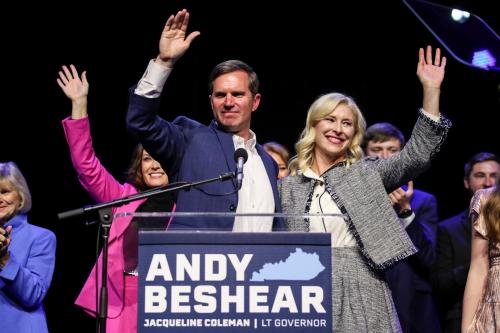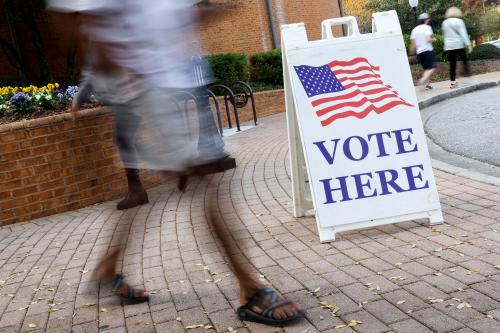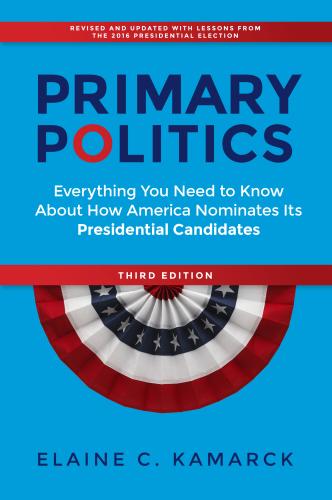So far this election cycle five issues have arisen that could blow up a Democratic candidate for president, a Democratic candidate for dog-catcher and everyone in between. The only exceptions are those Democratic candidates who live in Vermont or who live in the 17 congressional districts (approximately 4 percent of the House of Representatives,) that are so solidly Democratic that George Washington reincarnated as a Republican couldn’t win an election. [1]
For everyone else, there are minefields which have already caused some candidates to back off their original positions. Here are the ones that have come up so far.
1) Allow prisoners to vote.
Last November Florida voters passed Amendment 4, which would automatically restore the rights of felons to vote after they had completed their sentences, including parole and probation. The only exceptions were for those convicted of murder or a felony sexual offense. In passing this, Florida joined 37 other states with similar laws.
This approach is common sense. When a person is convicted of a crime they give up their freedom. Once a person has fulfilled their obligation to the state by serving their sentence, they should be able to become full citizens again. There are 12 states where felons cannot get back the right to vote and Democrats are right to advocate for changes in those states’ laws. And there are two states, Maine and Vermont, where felons never lose their right to vote.
Not surprisingly Senator Bernie Sanders of Vermont believes that people should be able to vote from jail —even the Boston bomber. This is a position not shared by many other people. In fact, Senator Kamala Harris (D-Calif.) has now backtracked from her original position on this, saying criminals like the Boston bomber should be deprived of their right to vote. In contrast, when the question was posed to him, Mayor Pete Buttigeig gave a quick and clear response in a CNN town hall. “No, I don’t think so,” he said, eliciting cheers from the audience.”
Sanders’ argument, that denying the vote to people in prison is a “slippery slope,” is simply not shared by the public. A Hill-HarrisX survey found that 69 percent of Americans did not think felons serving time should vote in national elections. Eighty-nine percent thought that terrorists serving time should not vote in national elections. Taking the extreme position on this puts Democrats on a track that simply doesn’t comport with most people’s commonsense notion of justice. Democrats should advocate for extending Florida’s Amendment 4 to other states and not get rope-a-doped into giving rights to terrorists.
2) Abortion
Abortion rights are under attack in Alabama and in several other states where pro-life legislative majorities are hoping to get a case to the Supreme Court to challenge Roe v. Wade. Democrats should and will defend Roe v. Wade. In doing so, however, they need to avoid being labeled as in favor of infanticide—a label the other party is itching to paste on them.
President Trump tried out this line of attack in his State of the Union address, stating, “New York cheered with delight upon the passage of legislation that would allow a baby to be ripped from the mother’s womb moments before birth.” That is a gross misinterpretation of a law which allows for women after 24 weeks of pregnancy to get an abortion if “there is an absence of fetal viability, [emphasis mine] or the abortion is necessary to protect the patient’s life or health.”
The reason that Roe v. Wade has stood the test of time is that it applies a commonsense test to the question of abortion, summed up in the following line from the decision: “With respect to the State’s important and legitimate interest in potential life, the ‘compelling’ point is at viability.”
The law and practice as it stands does not allow for infanticide—nor should it. And yet some Democrats, in their enthusiasm to defend a woman’s right to choose, come dangerously close to falling into that trap. One who did was Virginia Delegate Kathy Tran (D-Fairfax). Earlier this year she was asked by a Republican whether a woman in labor would be allowed to have an abortion. She answered yes and then had to reverse herself. “I wish I was quicker on my feet and I wish that I was able to be more agile in that moment,” she said. “And I misspoke, and I really regret that.” The clip (without retraction) quickly went viral, with President Trump chiming in to call her testimony “terrible.”
3) Abolish private health insurance
Health care should be a bright spot for Democrats. It was in 2018 and it should be in 2020. But some of the current candidates have unlearned the hard lessons from 1994 when Hillary Clinton’s health care plan failed. For many decades, the story of Americans and health care has been the same. By and large Americans like their own health care and aren’t interested in trading it in for some untested program run by the government. As the following Gallup polling data show, Americans do not think that the national health care coverage is good but twice as many (69 percent) think their own personal health care is good.
Americans’ Ratings of Coverage and Quality of Personal vs. National Healthcare
| Personal Healthcare | National Healthcare | Difference | |
| % Excellent/Good | % Excellent/Good | (percentage points) | |
| Healthcare coverage | 69 | 34 | +35 |
| Quality of Healthcare | 80 | 55 | +25 |
Source: Gallup (2018)
Taking something away from someone is always a more powerful political motivation than giving them something that they don’t yet understand or trust. And that is exactly what will happen if you tell nearly three-quarters of Americans who like their health care that they will lose it. In 2016 Colorado voters—while voting for Hillary over Trump—decisively turned down a single-payer plan on the ballot that would have ended private insurance, by a 79 to 21 percent margin.
Being careful about this does not mean Democrats can’t expand the buy-in age for Medicare or expand Medicaid. Nor does it mean that they can’t create what’s called a “public option”—something that was discussed but rejected by Obama and the Democratic Congress when they were crafting Obamacare. But telling those suburban moms who voted in Democratic members of Congress in 2018 that they will lose their private health insurance is a high-risk strategy.
4) Abolish ICE
ICE (Immigration and Customs Enforcement) is the unit within the Department of Homeland Security tasked with law enforcement at the border. ICE gained notoriety in the summer of 2018 when it became the government unit responsible for separating parents and children at the border. Many high-profile Democrats picked up the call to abolish ICE in response to the cruelty of that order.
However, simply abolishing ICE rather than reforming or replacing it with some other law enforcement entity risks placing the Democrats in the position of advocating open borders, where anyone—including those terrorists, rapists and drug dealers Donald Trump is always talking about—can come into the country. It is interesting to note that a large majority of the 20,000 people who work for ICE were working there when Barack Obama was president. Under Obama there were no calls to abolish ICE. What ICE did in the summer of 2018 was implement an immoral presidential directive.
Julian Castro, the former HUD Secretary and presidential candidate, has proposed breaking ICE in two, separating its national security functions from its enforcement and removal functions. Members of the criminal investigations arm of ICE have advocated for this themselves as well. There are undoubtedly other intelligent reform options available. But Democrats need to stay clear of letting swing voters think that they are in favor of completely open and lawless borders.
5) Embrace socialism
Finally, some Democratic candidates are freely throwing around the term “socialism.” As research by my colleagues E.J. Dionne and William Galston shows, there is a sharp generational divide when it comes to that word. For younger people it means a robust social safety net—free health care and college included. Meanwhile, their parents and grandparents view socialism “through the prism of Soviet Communism,” which includes state control of significant portions of the economy.
It may be that the former definition of socialism wins out over the long haul as memories of the collapse of the Soviet Union and the failure of eastern European and other socialist economies fade. But for the time being, the term is dynamite that the Republicans are enthusiastic about lighting. There are still millions of baby boomers in the electorate who hid under their desks in elementary school out of fear that the Soviets would drop an atom bomb on them. Democrats would be wise to lay off the term and talk about what has always been a plus for the party: an expanded and sturdy social safety net.
Back in 1972 the Democratic Party nominated a decent, experienced man—Senator George McGovern—to run against President Richard Nixon. But McGovern quickly became known as the candidate of “acid, abortion and amnesty.” (“Amnesty” in 1972 referred to amnesty for Vietnam war draft dodgers, not illegal immigrants.) McGovern lost in a landslide. Nearly half a century later, Democrats need to watch out for the minefields that may sound great in a primary but doom them in a general election.
[1] These districts have a Cook Partisan Voting Index (PVI) score of +30 Democratic.
The Brookings Institution is committed to quality, independence, and impact.
We are supported by a diverse array of funders. In line with our values and policies, each Brookings publication represents the sole views of its author(s).









Commentary
Five issue positions that could blow up a Democratic campaign
May 24, 2019